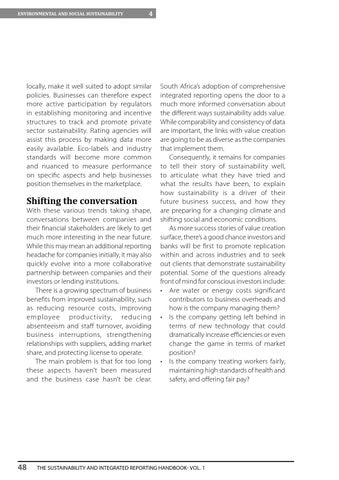ENVIRONMENTAL AND SOCIAL SUSTAINABILITY
4
locally, make it well suited to adopt similar policies. Businesses can therefore expect more active participation by regulators in establishing monitoring and incentive structures to track and promote private sector sustainability. Rating agencies will assist this process by making data more easily available. Eco-labels and industry standards will become more common and nuanced to measure performance on specific aspects and help businesses position themselves in the marketplace.
Shifting the conversation
With these various trends taking shape, conversations between companies and their financial stakeholders are likely to get much more interesting in the near future. While this may mean an additional reporting headache for companies initially, it may also quickly evolve into a more collaborative partnership between companies and their investors or lending institutions. There is a growing spectrum of business benefits from improved sustainability, such as reducing resource costs, improving employee productivity, reducing absenteeism and staff turnover, avoiding business interruptions, strengthening relationships with suppliers, adding market share, and protecting license to operate. The main problem is that for too long these aspects haven’t been measured and the business case hasn’t be clear.
48
South Africa’s adoption of comprehensive integrated reporting opens the door to a much more informed conversation about the different ways sustainability adds value. While comparability and consistency of data are important, the links with value creation are going to be as diverse as the companies that implement them. Consequently, it remains for companies to tell their story of sustainability well, to articulate what they have tried and what the results have been, to explain how sustainability is a driver of their future business success, and how they are preparing for a changing climate and shifting social and economic conditions. As more success stories of value creation surface, there’s a good chance investors and banks will be first to promote replication within and across industries and to seek out clients that demonstrate sustainability potential. Some of the questions already front of mind for conscious investors include: • Are water or energy costs significant contributors to business overheads and how is the company managing them? • Is the company getting left behind in terms of new technology that could dramatically increase efficiencies or even change the game in terms of market position? • Is the company treating workers fairly, maintaining high standards of health and safety, and offering fair pay?
THE SUSTAINABILITY AND INTEGRATED REPORTING HANDBOOK- VOL. 1
